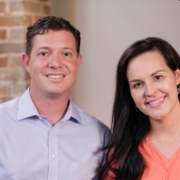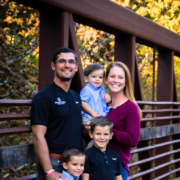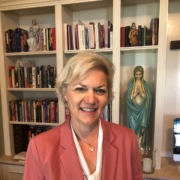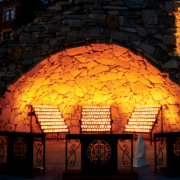The world today is facing a crisis in the family, but one graduate of a faithful Catholic college is working to change that. Mary Rose Verret, together with her husband Ryan, founded the ministry Witness to Love, which partners with more than 500 parishes in four countries and provides marriage preparation through virtue-based mentorship.
While a student at Christendom College in Front Royal, Va., which is recommended in The Newman Guide, Verret experienced community like she “never had before.” Much of the Witness to Love program was inspired by “trying to figure out how to invite newly engaged couples have that similar experience and community life.” In 2024, Ryan and Mary Rose were honored to be named as consultants to the Vatican’s Dicastery for the Laity, Family and Life for their work building up strong Catholic marriages.
In Witness to Love, couples are mentored by a married couple of their choosing from within their parish community. These mentors undergo training and then walk with the engaged couple throughout their engagement and beyond the altar, providing a model of marriage renewal and a connection to the parish. By providing couples with a strong witness to a living Catholic relationship and a strong tie to parish life, couples are encouraged to integrate themselves into parish life, form deep friendships and live out a virtuous marriage.
The results are staggering: “over the past five years, the divorce rate in parishes who have implemented Witness to Love has decreased by double digits and participation in parish life by newlyweds has increased from 10 percent to as high as 70-90 percent,” states Witness to Love’s Case for Support.
Verret explains that the ministry is so successful, because it invites the engaged couple into their Church community, similarly to how she was invited into the Catholic community at Christendom College.
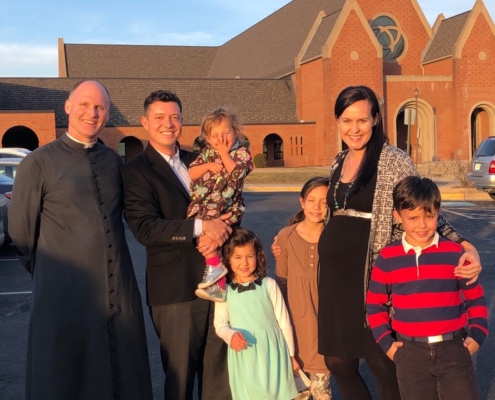
The Verret family with Fr. Thomas Vander Woude. Photo via Mary Rose Verret.
Her first experience of Christendom was in high school via a local priest, Fr. Thomas Vander Woude, who is a Christendom alumnus. She describes him as “the first priest I’d ever met who was cheerful and reverent and sincere and was definitely a witness of Christ.” At his encouragement, she attended a week-long Christendom Summer camp.
“It was the first experience in my life of being around a lot of amazing Catholics,” explains Verret. “Because where I lived, the Catholics I knew weren’t really different from the rest of the culture. At Christendom I was in a really intense, concentrated, really impactful witness of the students and teachers. I got to experience being in a community where everyone is focused on the same goal of getting to heaven and understanding the faith and learning together.”
After the summer program, Verret was determined to go to school there, even if it meant working multiple jobs. “I was all in,” she explains, “and it all started with Fr. Vander Woude and his witness… It was that personal connection with somebody who loved Christ and had also been impacted by that college.”
While at school, she formed deep bonds with the professors and their families. She explained, “That experience of being with the families, being with the professors, was more impactful than any other part of going to Christendom College, the witness of the professors and their wives and the family and being a part of that.”
She describes how the professors at Christendom invited students over for dinner and would share meals with them on campus. It was impactful for her to see her professors praying in the chapel and bringing their families to daily Mass.
Being around these professors, “you really get to experience a family life.” Verret explains how important this was for her, especially since her parents were divorced. “For someone who really wants something very different for themselves and their marriage, you should consider going to a small college like Christendom where you do have the ability to be part of the families of the faculty.”
God worked in her heart through those years and planted the seed for her ministry during a World Youth Day trip. She explains, “Even though I went to college, I still wasn’t really even at a point where I even believed in the Eucharist. I was going there because, I guess it was grace. It was Fr. Vander Woude’s suggestion, it was grace. I fell in love with the college, but I was still in need of evangelization, and definitely received it there. But World Youth Day was a turning point.”
While working on campus during the summer after her sophomore year at Christendom, a group of religious sisters who were staying on campus asked Verret to help them chaperone a trip to World Youth Day in Toronto, Canada. They left that day, and one night that week under the stars she heard Pope John Paul II say, “you are not the sum of your fears and failures, but you’re the sum of our Lord Jesus Christ and the Father’s love for you.” She describes that moment as a turning point in her life. She says found out later that her future husband Ryan was also at that World Youth Day, soaking in the same lessons about what it means to live a life as the sum of the Father’s love.
It was at that World Youth Day that Pope John Paul II declared that the world needs witnesses to God’s love. This inspired Verret: “The name ‘Witness to Love’ really came from that, that we need to be witnesses of God’s love in the world, and the mentor couples really are that witness. Because people today who have been away from church don’t just show up like, ‘I love Jesus, I love God, God loves me.’ Somebody leads them to Jesus, somebody loves them, somebody witnesses to them, somebody brings them to the church, just as the professors at Christendom were witnesses to me of God’s love.”
It wasn’t until she graduated and was working in the Marriage and Family Life Office in the Diocese of Lafayette—after doing the same work for three years in the Diocese of Arlington—that her calling became clear. In 2011 Verret left working for the Diocese of Lafayette, La., and began working at a parish. Working so closely with families and engaged couples, she saw the disconnect between couples who go through normal marriage preparations, yet they don’t stay married or continue going to Church.
“This whole marriage prep system is just broken, because most couples either come from divorced parents, parents who don’t go to Church, or parents who aren’t happily married. So they don’t really have a witness of what marriage looks like,” she explains. “Just like I didn’t. And not everybody is able to go to a college like Christendom, so they don’t all have that witness.”
The Verrets began the ministry in 2012, and word of this ministry spread, from pastor to pastor, bishop to bishop, couple to couple. She explained that many “marriage champions” stepped forward, wanting to assist in the mission.
Now the program has spread to 500+ parishes in the United States, Canada, France and Mexico. Their materials have been translated into Spanish and French. Witness to Love also offers a program version for civilly married couples who are seeking to have a sacramental marriage, and the ministry has created an interdenominational version for non-Catholics. The ministry offers its complete marriage formation, including its Be More Retreat, in-person at partnering parishes or online!
Editor’s Note: This article was originally published in 2019 and was updated in 2024.


